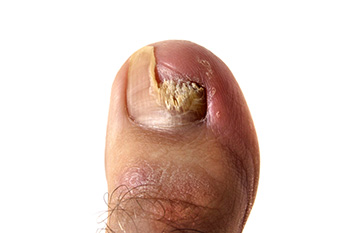
Thickened and discolored toenails could be caused by toenail fungus, but other conditions can cause the same symptoms. These signs might also be the result of bruises, warts, or some type of skin cancer. With toenail fungus, beyond discoloration of the nail, there may be debris under the nail, nail thickening, and an irregularity to the white part of the nail. A discolored spot under the toenail may be a sign of melanoma, a possibly fatal form of skin cancer. This usually presents as a brown or black streak that might look like a bruise. Darier disease is a genetic disorder that typically causes yellowish, wartlike blemishes on the body and red and white streaks on toenails. If you notice changes to your toenails and you do not know the cause, it is suggested that you see a podiatrist as soon as possible to treat whatever might be causing the condition.
If left untreated, toenail fungus may spread to other toenails, skin, or even fingernails. If you suspect you have toenail fungus it is important to seek treatment right away. For more information about treatment, contact one of our podiatrists of Jill Einhorn, DPM and James Einhorn, DPM. Our doctors can provide the care you need to keep you pain-free and on your feet.
Symptoms
Treatment
If self-care strategies and over-the-counter medications does not help your fungus, your podiatrist may give you a prescription drug instead. Even if you find relief from your toenail fungus symptoms, you may experience a repeat infection in the future.
Prevention
In order to prevent getting toenail fungus in the future, you should always make sure to wash your feet with soap and water. After washing, it is important to dry your feet thoroughly especially in between the toes. When trimming your toenails, be sure to trim straight across instead of in a rounded shape. It is crucial not to cover up discolored nails with nail polish because that will prevent your nail from being able to “breathe”.
In some cases, surgical procedure may be needed to remove the toenail fungus. Consult with your podiatrist about the best treatment options for your case of toenail fungus.
If you have any questions, please feel free to contact our offices located in Brooklyn and Astoria, NY . We offer the newest diagnostic and treatment technologies for all your foot care needs.